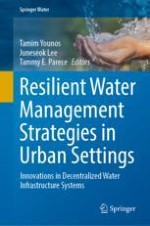2022 | OriginalPaper | Buchkapitel
Maximizing the Benefits of Rainwater Harvesting Systems: Review and Analysis of Selected Case Study Examples
verfasst von : Kathy DeBusk Gee, Sarah Sojka
Erschienen in: Resilient Water Management Strategies in Urban Settings
Aktivieren Sie unsere intelligente Suche, um passende Fachinhalte oder Patente zu finden.
Wählen Sie Textabschnitte aus um mit Künstlicher Intelligenz passenden Patente zu finden. powered by
Markieren Sie Textabschnitte, um KI-gestützt weitere passende Inhalte zu finden. powered by
